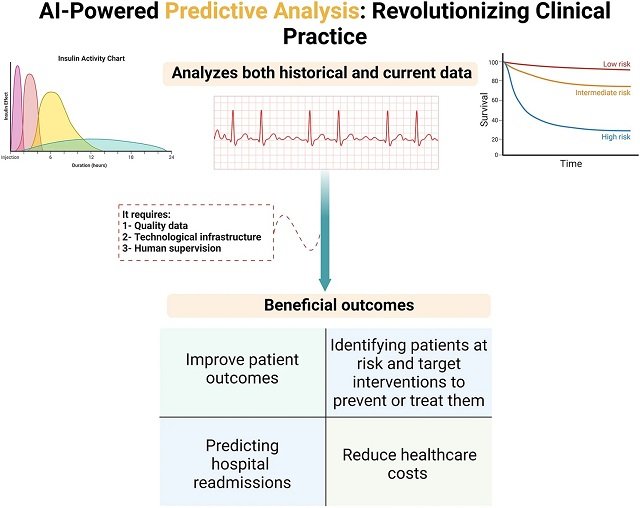
Imagine a world where a doctor instantly diagnoses your illness based on a quick scan of your retina. Or where personalized AI programs guide you toward optimal health, predicting and preventing diseases even before they begin. This is not science fiction—it’s the near future, driven by the exponential rise of artificial intelligence (AI) in healthcare.
The healthcare industry, long criticized for its inefficiencies and reactive approach, is undergoing a radical transformation. There is great optimism among scientists, doctors, and citizens that the application of artificial intelligence (AI) can provide substantial improvements across all areas of healthcare, from diagnosis to treatment (Bohr and Memarzadeh, 2020).
For many, the term ‘Artificial Intelligence in Healthcare’ conjures images of futuristic robots replacing doctors or dystopian algorithms dictating medical decisions. However, the reality is much more nuanced and, dare we say, optimistic. AI is not here to replace healthcare professionals but to enhance their capabilities, empowering them to deliver better, faster, and more precise care.
The potential of AI in healthcare is undeniable, and the market is expected to grow exponentially in the coming years as various applications are developed to address some of the most pressing challenges facing healthcare organizations (Chen and Decary, 2020). According to a recent report by Grand View Research, the global AI in healthcare market is projected to reach a staggering $208.2 billion by 2030, driven by the growing demand for personalized medicine, improved diagnostics, and cost-effective healthcare solutions.
This article aims to provide you with an overview of the use of artificial intelligence in health, showcasing examples of startups employing AI to offer a range of health diagnostic services, and also discussing the ethics of using these services.
What is AI in healthcare?
In simple terms, artificial intelligence in health is the application of machine learning algorithms and deep learning techniques to analyze large amounts of medical data, from patient records and imaging scans to genomic sequences and clinical research, to improve medical diagnosis, treatment, and management.
AI in healthcare, also known as artificial intelligence in health or artificial intelligence in medicine, encompasses a wide range of technologies, from medical image analysis that detects tumors with superhuman accuracy to virtual assistants providing 24/7 health support and answering patient questions.
Benefits of Artificial Intelligence in Healthcare
Kumar et al., (2023) state that the use of artificial intelligence (AI) in medicine is beginning to alter current procedures in prevention, diagnosis, treatment, improvement, cure of diseases, and other physical and mental impairments. So, how does AI exactly affect different areas of healthcare? Let’s delve into some key applications:
Diagnosis and Prediction of Diseases
- AI-driven algorithms can analyze medical images such as X-rays and magnetic resonance imaging with incredible precision, detecting anomalies and malignant tumors that could escape the human eye. This translates to earlier diagnoses, more accurate treatment plans, and ultimately better outcomes for patients. The study by Shoshan et al., (2022) found that AI could identify normal digital breast tomosynthesis screening exams, reducing the number of exams requiring radiologist interpretation in a simulated clinical workflow.
- Predictive Analysis: Use AI to analyze individual health data and identify risk factors for future diseases. Think of it as a crystal ball for your health, allowing you to take proactive measures and prevent diseases before they take hold. According to Alowais et al., (2023), one area where predictive analysis can be crucial is in identifying patients at risk of developing chronic diseases such as endocrine or heart diseases.

Personalized Medicine and Treatment
- AI-based treatment plans can be tailored to individual patients based on their genetic composition, medical history, and unique lifestyle factors. This personalized approach promises more effective and targeted therapies with reduced side effects.
- AI-assisted robotic surgery offers minimally invasive procedures with greater precision and control, leading to faster recoveries and shorter hospital stays.
- Drug Discovery and Development: AI is revolutionizing the laborious drug discovery process. By analyzing vast sets of molecular structures and biological pathways, AI can identify promising drug candidates and predict their potential efficacy and safety, significantly reducing the time and cost of bringing new drugs to market. Bhattamisra et al., (2023) highlight that with the advancement of artificial intelligence technologies, the scientific community may witness rapid and cost-effective pharmaceutical and healthcare research, providing better service to the general public.
Administrative Efficiency and Accessibility
- AI-powered chatbots can answer patient questions, schedule appointments, and even triage symptoms, relieving healthcare professionals of some burdens and freeing up their time for more complex tasks. Musheyev et al., (2024) report that AI-powered chatbots produce generally accurate and moderately high-quality information in response to popular Google searches on urological cancers.
- AI-enhanced Electronic Health Records (EHR) can analyze patient data across different hospitals and clinics, providing a comprehensive picture for better-informed clinical decisions.
Examples of Artificial Intelligence Startups in Healthcare
Startups leverage the capabilities of artificial intelligence, machine learning, and data analysis to develop solutions addressing challenges in patient care, diagnosis, and healthcare management.
Some market-leading startups include:
- PathAI: A pioneer in AI-driven pathology, it employs machine learning to assist pathologists in diagnosing diseases accurately and efficiently.
- Tempus: Focused on precision medicine, Tempus uses AI to analyze clinical and molecular data, personalizing treatment plans for cancer patients.
- Zebra Medical Vision: Specializing in medical imaging, Zebra Medical Vision’s AI algorithms aid in early disease detection through advanced radiological analysis.
- Butterfly Network: Using AI and ultrasound, Butterfly Network’s portable devices offer a cost-effective and portable solution for various medical imaging applications.
Ethics of Using Artificial Intelligence in Healthcare
But it’s not all sunshine and rainbows. The rise of AI in healthcare also raises concerns about ethics, data privacy, and job displacement. Solanki et al., (2023) highlight that artificial intelligence poses an imminent risk of causing individual and societal harm, for example, exacerbating inequalities among minority groups.
Ethical considerations arise when using AI in healthcare, including issues like informed consent, privacy, and accountability for decisions made by AI systems (Grzybowski et al., 2024); ensuring that AI programs do not perpetuate existing inequalities in healthcare access and outcomes is crucial.
Moreover, data privacy should be paramount, with robust security measures in place to protect patient confidential information. While AI can automate some tasks, it should complement, not replace, the irreplaceable human touch and empathy in healthcare.
Federspiel et al., (2023) identified how artificial intelligence could harm human health through its impacts on social determinants and upstream health through control and manipulation of individuals, the use of autonomous lethal weapons, and effects on work and employment.
In this regard, Solanki et al., (2023) propose a framework for AI developers to operationalize ethics in healthcare AI solutions; meanwhile, Masters (2023) presents a guide focusing on the ethical issues likely to be faced by health professions education (HPE) instructors and administrators when encountering and using AI systems in their teaching environment.
Internet of Things and Artificial Intelligence in Healthcare
The Internet of Things (IoT) and Artificial Intelligence (AI) collaborate to enhance healthcare. From remote patient monitoring to data security and personalized treatments, the synergy between these technologies is fundamentally transforming how we conceive and deliver healthcare services.
Table 01. Integration between IoT and AI in healthcare.
| Aspect | Internet of Things (IoT) | Artificial Intelligence (AI) |
|---|---|---|
| Remote Patient Monitoring | Wearable devices, smart sensors for continuous health data | Predictive analysis for risk assessment |
| Improved Diagnostics | IoT-enabled medical devices | AI algorithms analyze and expedite diagnostic processes |
| Smart Healthcare Facilities | Connected medical devices, asset tracking | AI-driven optimization of operational processes |
| Telemedicine and Virtual Health Assistants | IoT-connected devices for remote consultations | AI-powered virtual health assistants enhance accessibility |
| Medication Adherence and Smart Drug Delivery | Real-time medication intake tracking | Personalized medication plans through AI analysis |
| Data Security and Privacy | Cybersecurity measures for IoT, blockchain technology | AI-driven anomaly detection for enhanced data security |
| Personalized Treatment Plans | Individual health data from IoT devices | AI contributes to personalized treatment strategies |
Big Data and AI in Healthcare
The convergence of Big Data and Artificial Intelligence (AI) in healthcare is catalyzing a paradigm shift, revolutionizing how we approach patient care, medical research, and healthcare management. This powerful combination has the potential to unlock valuable insights, enhance diagnostics, and improve overall healthcare outcomes.
Table 02. Integration between Big Data and Artificial Intelligence in Healthcare.
| Aspect | Big Data | Artificial Intelligence (AI) |
|---|---|---|
| Storage and Data Management | Storage of vast health datasets | AI algorithms efficiently manage and analyze large datasets |
| Clinical Decision Support Systems | Aggregation and analysis of diverse clinical data | AI-driven systems provide real-time information for clinical decision-making |
| Predictive Analytics | Identification of patterns and trends from historical data | AI algorithms predict potential health risks and outcomes |
| Genomic Medicine | Analysis of extensive genomic datasets | AI interprets and analyzes genomic data for personalized medicine |
| Drug Discovery and Development | Processing and analysis of molecular data | AI accelerates drug discovery through predictive modeling |
| Personalized Treatment Plans | Tailoring treatments based on patient data | AI contributes to the development of individualized treatment strategies |
| Operational Efficiency in Healthcare | Analysis of administrative and operational data | AI optimizes processes, reducing costs and improving efficiency |
| Disease Surveillance and Outbreak Prediction | Monitoring health trends in the population | AI enhances surveillance, predicting and preventing disease outbreaks |
| Image Analysis in Diagnostics | Management and analysis of medical imaging data | AI interprets complex medical images for faster and more accurate diagnostics |
Impacts and Key Benefits
- Precision Medicine: The combination of Big Data and Artificial Intelligence (AI) enables healthcare professionals to delve into extensive datasets, unraveling patterns in genomics, patient history, and treatment outcomes. This precision allows for personalized medicine, tailoring treatments to an individual’s unique genetic composition.
- Predictive Healthcare: AI-driven predictive analysis utilizes historical patient data to foresee potential health issues, enabling proactive interventions and preventive measures.
- Drug Discovery Acceleration: Big Data facilitates the storage and analysis of vast molecular datasets, while AI accelerates the drug discovery process by predicting potential drug candidates and optimizing clinical trial designs.
- Efficient Healthcare Operations: The integration of Big Data and AI streamlines administrative and operational processes, reducing costs and improving overall healthcare efficiency.
- Enhanced Diagnosis: AI-driven image analysis, coupled with Big Data’s massive storage capabilities, improves the accuracy and speed of diagnostic processes, leading to more effective patient care.
- Public Health Management: The combination of Big Data analysis and artificial intelligence enhances disease surveillance, aiding in early detection, prediction, and management of public health crises.
The collaboration between Big Data and AI is transforming healthcare into a more data-driven and patient-centered industry. As these technologies continue to evolve, the potential for groundbreaking discoveries, better patient outcomes, and a more efficient healthcare ecosystem becomes increasingly evident. The future of healthcare is being rewritten, where data-driven insights and AI-based solutions pave the way towards a healthier world.
Future of AI in Healthcare
The complexity and increasing data in healthcare make artificial intelligence more frequently applied in medicine (Davenport and Kalakota, 2019).
So, what does the future hold for AI in healthcare? The possibilities are limitless. Imagine a world where AI-driven nanobots roam your bloodstream, repairing cells and detecting diseases at a microscopic level. Or where personalized health advisors, powered by artificial intelligence and big data, guide you toward optimal physical and mental well-being.
To ensure that AI in healthcare reaches its full potential and benefits, it is necessary to raise awareness among developers, healthcare professionals, and policymakers about the challenges and limitations of opaque algorithms in medical AI and encourage multidisciplinary collaboration in the future (Amann et al., 2020). Additionally, it is the responsibility of the education system in the medical field to equip future doctors with the resources and strategies that allow them to adapt to their new roles (Kumar et al., 2023).
The future of healthcare is not just about treating diseases but preventing them and promoting longevity. In this endeavor, AI will be our primary partner, guiding us toward a healthier, happier, and more resilient future.
Conclusion
AI is transforming healthcare, with the potential to improve patient outcomes, reduce costs, and make healthcare more accessible. By addressing the challenges posed by AI, we can ensure that it is used to enhance healthcare for everyone.
However, ethical challenges related to patient’s private information or misuse that may arise from the use of new technologies are presented. In this context, it is necessary to develop and adopt a series of criteria.
This is just the beginning of the AI revolution in healthcare. Are you ready to be part of it?
References
Alowais, S. A., Alghamdi, S. S., Alsuhebany, N., Alqahtani, T., Alshaya, A. I., Almohareb, S. N., … & Albekairy, A. M. (2023). Revolutionizing healthcare: the role of artificial intelligence in clinical practice. BMC medical education, 23(1), 689.
Amann, J., Blasimme, A., Vayena, E., Frey, D., Madai, V. I., & Precise4Q Consortium. (2020). Explainability for artificial intelligence in healthcare: a multidisciplinary perspective. BMC medical informatics and decision making, 20, 1-9.
Bhattamisra, Subrat Kumar, Priyanka Banerjee, Pratibha Gupta, Jayashree Mayuren, Susmita Patra, and Mayuren Candasamy. 2023. “Artificial Intelligence in Pharmaceutical and Healthcare Research” Big Data and Cognitive Computing 7, no. 1: 10. https://doi.org/10.3390/bdcc7010010
Bohr, A., & Memarzadeh, K. (2020). The rise of artificial intelligence in healthcare applications. In Artificial Intelligence in healthcare (pp. 25-60). Academic Press.
Chen, M., & Decary, M. (2020, January). Artificial intelligence in healthcare: An essential guide for health leaders. In Healthcare management forum (Vol. 33, No. 1, pp. 10-18). Sage CA: Los Angeles, CA: SAGE Publications.
Davenport, T., & Kalakota, R. (2019). The potential for artificial intelligence in healthcare. Future healthcare journal, 6(2), 94.
Federspiel, F., Mitchell, R., Asokan, A., Umana, C., & McCoy, D. (2023). Threats by artificial intelligence to human health and human existence. BMJ global health, 8(5).
Grzybowski, A., Jin, K., & Wu, H. (2024). Challenges of artificial intelligence in medicine and dermatology. Clinics in Dermatology.
Kumar, P., Chauhan, S., & Awasthi, L. K. (2023). Artificial intelligence in healthcare: review, ethics, trust challenges & future research directions. Engineering Applications of Artificial Intelligence, 120, 105894.
Masters, K. (2023). Ethical use of artificial intelligence in health professions education: AMEE Guide No. 158. Medical Teacher, 45(6), 574-584.
Musheyev, D., Pan, A., Loeb, S., & Kabarriti, A. E. (2024). How well do artificial intelligence chatbots respond to the top search queries about urological malignancies?. European Urology, 85(1), 13-16.
Shoshan, Y., Bakalo, R., Gilboa-Solomon, F., Ratner, V., Barkan, E., Ozery-Flato, M., … & Mullen, L. A. (2022). Artificial intelligence for reducing workload in breast cancer screening with digital breast tomosynthesis. Radiology, 303(1), 69-77.
Solanki, P., Grundy, J., & Hussain, W. (2023). Operationalising ethics in artificial intelligence for healthcare: A framework for AI developers. AI and Ethics, 3(1), 223-240.
Editor and founder of “Innovar o Morir” (‘Innovate or Die’). Milthon holds a Master’s degree in Science and Innovation Management from the Polytechnic University of Valencia, with postgraduate diplomas in Business Innovation (UPV) and Market-Oriented Innovation Management (UPCH-Universitat Leipzig). He has practical experience in innovation management, having led the Fisheries Innovation Unit of the National Program for Innovation in Fisheries and Aquaculture (PNIPA) and worked as a consultant on open innovation diagnostics and technology watch. He firmly believes in the power of innovation and creativity as drivers of change and development.





